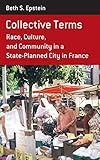Collective Terms : Race, Culture, and Community in a State-Planned City in France / Beth S. Epstein.
Material type: TextSeries: Berghahn Monographs in French Studies ; 10Publisher: New York ; Oxford : Berghahn Books, [2011]Copyright date: ©2011Description: 1 online resource (220 p.)Content type:
TextSeries: Berghahn Monographs in French Studies ; 10Publisher: New York ; Oxford : Berghahn Books, [2011]Copyright date: ©2011Description: 1 online resource (220 p.)Content type: - 9780857450845
- 9780857450852
- 307.1/41408900944367
- HN49.C6 E77 2011
- online - DeGruyter
| Item type | Current library | Call number | URL | Status | Notes | Barcode | |
|---|---|---|---|---|---|---|---|
 eBook
eBook
|
Biblioteca "Angelicum" Pont. Univ. S.Tommaso d'Aquino Nuvola online | online - DeGruyter (Browse shelf(Opens below)) | Online access | Not for loan (Accesso limitato) | Accesso per gli utenti autorizzati / Access for authorized users | (dgr)9780857450852 |
Frontmatter -- CONTENTS -- List of Illustrations -- Acknowledgments -- Abbreviations -- Introduction. Collective Terms -- Chapter 1 Urban Plans -- Chapter 2 Community Ties -- Chapter 3 To Be Exclu -- Chapter 4 Race-Conscious and Race-Blind: A Housing Crisis -- Chapter 5 The Common Good: Parents, Teachers, and the Public Schools -- Chapter 6 Having Culture -- Conclusion. In Other Words -- Appendix -- Notes -- Bibliography -- Index
restricted access online access with authorization star
http://purl.org/coar/access_right/c_16ec
The banlieue, the mostly poor and working-class suburbs located on the outskirts of major cities in France, gained international media attention in late 2005 when riots broke out in some 250 such towns across the country. Pitting first- and second-generation immigrant teenagers against the police, the riots were an expression of the multiplicity of troubles that have plagued these districts for decades. This study provides an ethnographic account of life in a Parisian banlieue and examines how the residents of this multiethnic city come together to build, define, and put into practice their collective life. The book focuses on the French ideal of integration and its consequences within the multicultural context of contemporary France. Based on research conducted in a state-planned ville nouvelle, or New Town, the book also provides a view on how the French state has used urban planning to shore up national priorities for social integration. Collective Terms proposes an alternative reading of French multiculturalism, suggesting fresh ways for thinking through the complex mix of race, class, nation, and culture that increasingly defines the modern urban experience.
Mode of access: Internet via World Wide Web.
In English.
Description based on online resource; title from PDF title page (publisher's Web site, viewed 25. Jun 2024)


